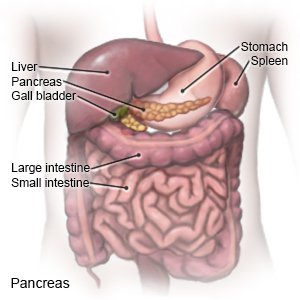Pancreatic Stent Placement
Medically reviewed by Drugs.com. Last updated on Apr 6, 2025.
A stent is a small tube used to widen a pancreatic duct and keep it open. Pancreatic fluid normally flows through the ducts. Smaller ducts empty fluid into the main duct. A stent can help treat a narrow, blocked, or leaking duct, or drain extra fluid. One or more stents may be placed before certain procedures to prevent pancreatitis (inflammation of the pancreas). Pancreatic stent placement may be done during endoscopic retrograde cholangiopancreatography (ERCP).
 |
DISCHARGE INSTRUCTIONS:
Call your local emergency number (911 in the US) if:
- You have chest pain.
- You have sudden or severe trouble breathing.
Call your doctor if:
- You have severe pain in your throat 2 days after the procedure.
- You have trouble swallowing.
- You have severe abdominal pain or your abdomen is larger than usual.
- You faint.
- You vomit blood or something that looks like coffee grounds.
- You have blood in your bowel movements, or your bowel movements look like tar.
- You have a fever or chills.
- You have nausea or are vomiting.
- You have questions or concerns about your condition or care.
Drugs used to treat this and similar conditions
Creon
Creon (pancrelipase) contains digestive enzymes and is used to improve food digestion in people who ...
Zenpep
Zenpep (pancrealipase) is used to replace pancreatic enzymes when the body does not have enough of ...
Omvoh
Omvoh is used to treat moderate to severe ulcerative colitis or Crohn's disease in adults. This ...
Albutein
Albutein is used for burns, external, hypoproteinemia, pancreatitis, peritonitis, postoperative ...
Pancreaze
Pancreaze (pancrelipase) is used to treat exocrine pancreatic insufficiency. Includes Pancreaze ...
Flexbumin
Flexbumin is used to treat patients suffering from shock, blood loss and severe burns. Learn about ...
Pancreatin 4X
Pancreatin 4X is used for chronic pancreatitis, cystic fibrosis, pancreatitis
Alburx
Alburx is used for burns, external, hypoproteinemia, pancreatitis, peritonitis, postoperative ...
Viokace
Viokace (pancrelipase) is used to treat exocrine pancreatic insufficiency due to chronic ...
Medicines:
- Prescription pain medicine may be given. Ask your healthcare provider how to take this medicine safely. Some prescription pain medicines contain acetaminophen. Do not take other medicines that contain acetaminophen without talking to your healthcare provider. Too much acetaminophen may cause liver damage. Prescription pain medicine may cause constipation. Ask your healthcare provider how to prevent or treat constipation.
- Take your medicine as directed. Contact your healthcare provider if you think your medicine is not helping or if you have side effects. Tell your provider if you are allergic to any medicine. Keep a list of the medicines, vitamins, and herbs you take. Include the amounts, and when and why you take them. Bring the list or the pill bottles to follow-up visits. Carry your medicine list with you in case of an emergency.
Self-care:
- Rest when you feel it is needed. You may be drowsy for up to 24 hours after your procedure. Return to your daily activities as directed.
- Drink liquids as directed. Liquids will help flush the contrast liquid from your body. Ask how much liquid to drink each day and which liquids are best for you.
- Ask when you can eat regular foods. Healthy foods include fruits, vegetables, whole-grain breads, low-fat dairy products, beans, lean meats, and fish. Eat small meals more often. This may help prevent nausea.
- Relieve a sore throat with ice chips, liquids, or lozenges as directed.
- Do not take aspirin after your procedure unless your healthcare provider says it is okay. Aspirin may increase your risk for bleeding.
Follow up with your healthcare provider as directed:
You will need to return in 3 to 4 weeks to make sure the stent is still in the right place. Write down your questions so you remember to ask them during your visits.
© Copyright Merative 2025 Information is for End User's use only and may not be sold, redistributed or otherwise used for commercial purposes.
The above information is an educational aid only. It is not intended as medical advice for individual conditions or treatments. Talk to your doctor, nurse or pharmacist before following any medical regimen to see if it is safe and effective for you.
Further information
Always consult your healthcare provider to ensure the information displayed on this page applies to your personal circumstances.
